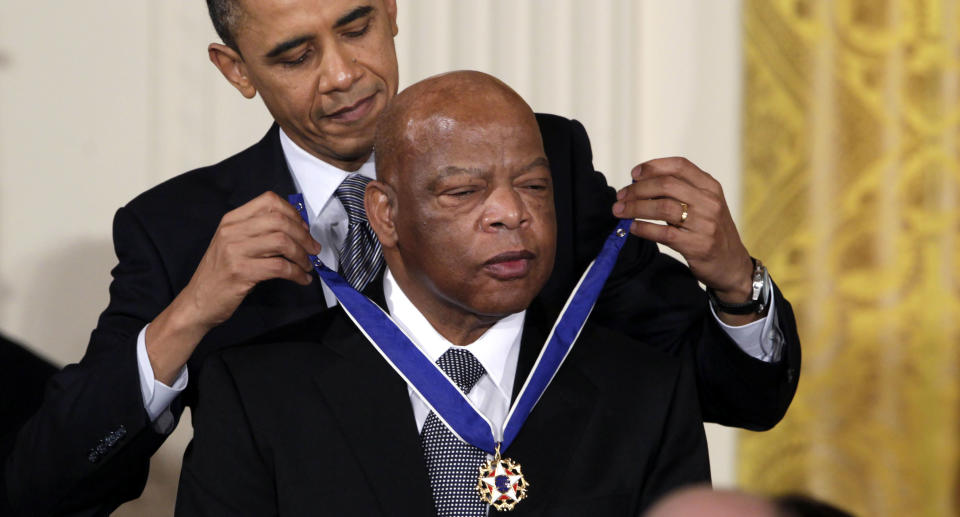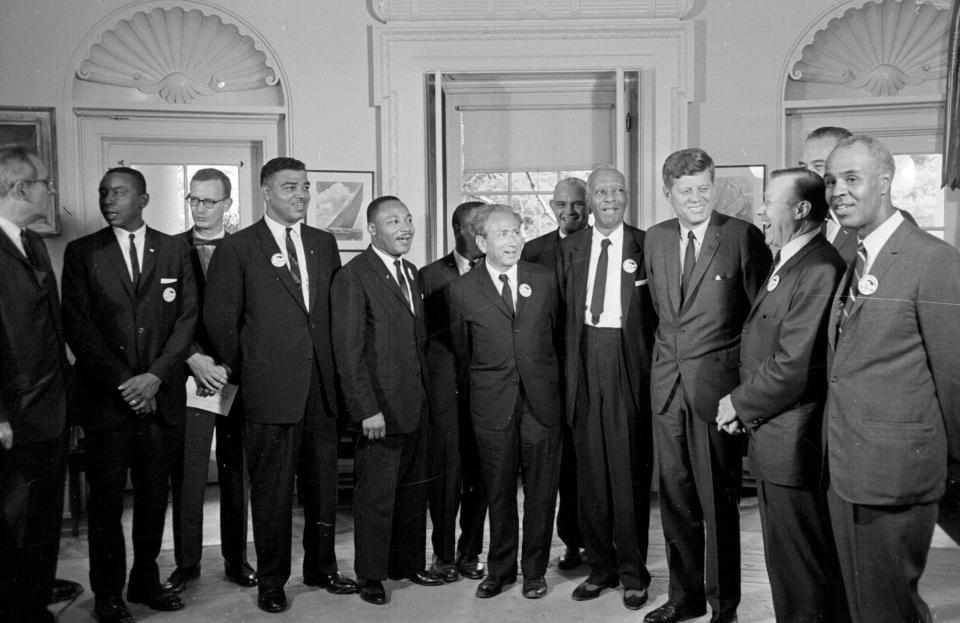John Lewis: US civil rights leader dies aged 80
John Lewis, a lion of the civil rights movement whose bloody beating by Alabama state troopers in 1965 helped galvanise opposition to racial segregation, and who went on to a long and celebrated career in Congress, has died aged 80.
House Speaker Nancy Pelosi confirmed Mr Lewis' passing late on Friday night (local time), calling him "one of the greatest heroes of American history".
“All of us were humbled to call Congressman Lewis a colleague, and are heartbroken by his passing,” Ms Pelosi said.
“May his memory be an inspiration that moves us all to, in the face of injustice, make 'good trouble, necessary trouble'.”
Mr Lewis’s announcement in late December 2019 he had been diagnosed with advanced pancreatic cancer – "I have never faced a fight quite like the one I have now," he said – inspired tributes from both sides of the aisle, and an unstated accord the likely passing of this Atlanta Democrat would represent the end of an era.

He was the youngest and last survivor of the Big Six civil rights activists, a group led by the Reverend Martin Luther King Jr that had the greatest impact on the movement. He was best known for leading some 600 protesters in the Bloody Sunday march across the Edmund Pettus Bridge in Selma.
At age 25 – walking at the head of the march with his hands tucked in the pockets of his tan overcoat – Mr Lewis was knocked to the ground and beaten by police. His skull was fractured and nationally televised images of the brutality forced the country's attention on racial oppression in the South.
Within days, Rev King led more marches in the state and President Lyndon Johnson soon was pressing Congress to pass the Voting Rights Act. The bill became law later that year, removing barriers that had barred Blacks from voting.
"John is an American hero who helped lead a movement and risked his life for our most fundamental rights; he bears scars that attest to his indefatigable spirit and persistence," House Majority Leader Steny Hoyer said after Mr Lewis announced his cancer diagnosis.

Mr Lewis joined Rev King and four other civil rights leaders in organising the 1963 March on Washington. He spoke to the vast crowd just before Rev King delivered his epochal "I Have a Dream" speech.
A 23-year-old firebrand, Mr Lewis toned down his intended remarks at the insistence of others, dropping a reference to a "scorched earth" march through the South and scaling back criticisms of President John Kennedy.
It was a potent speech nonetheless, in which he vowed: "By the forces of our demands, our determination and our numbers, we shall splinter the segregated South into a thousand pieces and put them together in an image of God and democracy."
It was almost immediately, and forever, overshadowed by the words of Rev King, the man who had inspired him to activism.
John Lewis’s civil rights rise
Mr Lewis was born on February 21, 1940, outside the town of Troy, in Pike County, Alabama. He grew up on his family's farm and attended segregated public schools.
As a boy, he wanted to be a minister and practiced his oratory on the family chickens.
Denied a library card because of the colour of his skin, he became an avid reader, and could cite obscure historical dates and details even in his later years.
He was a teenager when he first heard Rev King preaching on the radio. They met when Mr Lewis was seeking support to become the first Black student at Alabama's segregated Troy State University.
He ultimately attended the American Baptist Theological Seminary and Fisk University in Nashville, Tennessee. He began organising sit-in demonstrations at whites-only lunch counters and volunteering as a Freedom Rider, enduring beatings and arrests while travelling around the South to challenge segregation.
Mr Lewis helped found the Student Nonviolent Coordinating Committee and was named its chairman in 1963, making him one of the Big Six at a tender age.
The others, in addition to Rev King, were Whitney Young of the National Urban League; A. Philip Randolph of the Negro American Labor Council; James L. Farmer Jr., of the Congress of Racial Equality; and Roy Wilkins of the NAACP.
All six met at the Roosevelt Hotel in New York to plan and announce the March on Washington.
The huge demonstration galvanised the movement, but success didn't come quickly.
After extensive training in non-violent protest, Mr Lewis and Reverend Hosea Williams led demonstrators on a planned march of about 96 kilometres from Selma to Montgomery, Alabama's capital, on March 7, 1965.
A phalanx of police blocked their exit from the Selma bridge.
Mr Lewis' wife of four decades, Lillian Miles, died in 2012. They had one son, John Miles Lewis.
Do you have a story tip? Email: newsroomau@yahoonews.com.
You can also follow us on Facebook, Instagram and Twitter and download the Yahoo News app from the App Store or Google Play.



